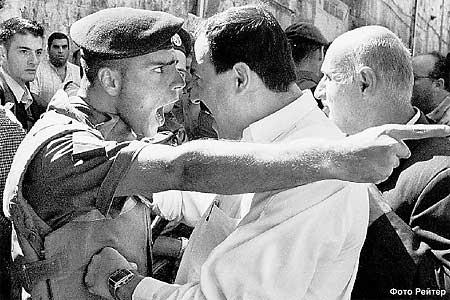Tisha B'Av as the Jewish Nakba
Our first Nakba occurred after Zedekiah, the last king of Judea, rebelled against Babylonian King Nebuchadnezzar (2 Chronicles 36:13 ). The revolt ended with the destruction of the First Temple on the 9th day of Av, 586 B.C.E. Toward the end of the Second Temple period, in 66 C.E., Jews started the Great Revolt by assaulting Masada and slaying the Romans that were there (Josephus, "War of the Jews" 17.1 ). Jews tried to shake off Roman rule but this "intifada" led to the loss of the Second Temple on the 9th of Av, in the year 70 C.E. The Bar Kochba revolt, which can be seen as our second intifada, resulted in the capture of Betar on the 9th of Av, 135 C. E., and the Jews' expulsion from the land of Judea.
Preserving the memory of destruction had other implications for modern-day Zionism. It made us remember the geography of the Land of Israel as it was before there were foreign occupiers. Maps made 100 years before the creation of Israel depict the territories of the 12 tribes mentioned in the Bible without any reference to the Ottoman rulers at the time. And think about all those pre-state JNF blue boxes, portraying the Land of Israel without reference to any Arab towns or villages, as if they never existed.
Clearly, Jews have mourned the loss of their national home the rest of the year, not only on Tisha B'Av, just as Palestinians mourn the loss of Palestine every day. Rather, Tisha B'Av symbolizes the peak of remembering that loss. Jews observing the day never called for a violent takeover of the Land of Israel, but all that mourning preserved our claim to the country. Zionism was thus able to resonate with the Jewish people, approximately 1,800 years after the loss of their national center, when it sought political hegemony over the Land of Israel.
It should come as no surprise then that the Palestinians too seek to preserve hope of their redemption. Just like us, they have a date. Just like us, they make maps of their destroyed villages and omit modern Jewish cities. And just like us, they justify the war that led to their own destruction and exile.
There is plenty of room to hold them accountable for harming their own cause through intransigence and continued support of terror. Our narrative is arguably closer to the historical truth. But to deny Palestinians, including Palestinian-Israelis, the commemoration of Nakba Day is hypocritical. We certainly did not like being told that it was forbidden to mark out commemoration days when we were the occupied.
So to those in the government who would ban Nakba observances, I offer this challenge: If you want to be consistent, you have a few options. You could ban Tisha B'Av ceremonies, but the holiday has too many other important messages. You can order all educational institutions to teach the Babylonian and Roman narratives so that Jews understand that we were wrong to fight against the legitimate rulers, respectively, of the Land of Israel. That would resolve the historic inconsistencies of the day.
Or, you can welcome Nakba Day without fear by engaging Palestinians in dialogue about memory, destruction and repentance. This approach would be consistent with the spirit of Tisha B'Av and the day's aspiration for teshuva, as emphasized by the Rambam in Hilchot Taanit (1:1-3; 5:1 ).
By Steven Klein
Dr. Steven Klein is an editor at Haaretz English Edition. He received his Ph.D. from Bar-Ilan University in the conflict management and negotiation program.

